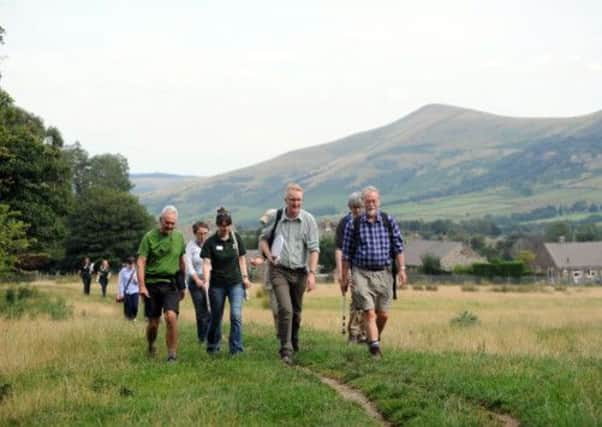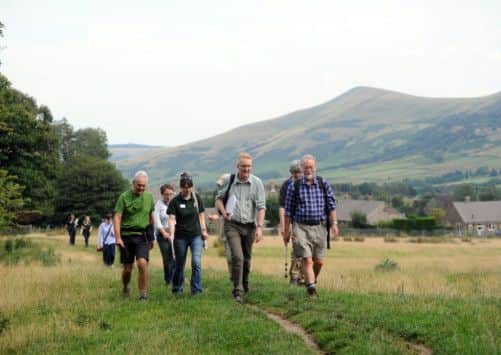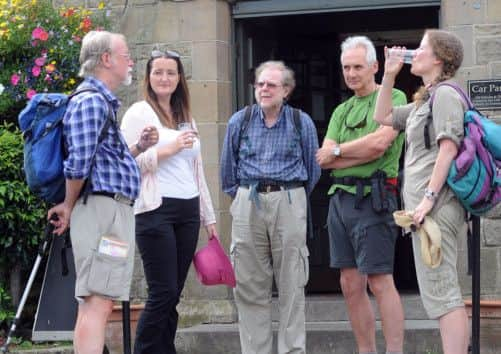Video: Rambling back to where it all began


They say an army marches on its stomach, which may explain why less than two minutes into the launch of a campaign instrumental in pinning down the Ramblers’ mission plan for the next decade we’ve already stopped for refreshments.
However, while the group gathered around the bar of the appropriately named Rambler Inn in the picturesque Peak District village of Edale might look much like the dozen or so other walkers taking a well-earned break, it’s business rather than pleasure which is being discussed over the halves of real ale.
Advertisement
Hide AdAdvertisement
Hide AdYesterday, the organisation launched the biggest public consultation process in its history, which will see its members carrying out impromptu surveys in supermarket car parks, cafés and pubs like the one at Edale in an effort to find out which of the many burning rural issues should be its focus for the next 10 years.


The location for the first event was no accident. Just a couple of miles down the road is Kinder Scout which back in 1932 was the scene of the history-making mass trespass. The event marked the beginning of a long and hard-fought campaign to open up rights of way to walkers across England and Wales.
The Ramblers’ latest move is partly a fact-finding mission for its own ends, but it’s also a bid to show that behind the thermos flasks of piping hot tea and sturdy walking boots lies a radical organisation which still has the power to influence government policy.
“I think we probably do suffer from a bit of an image problem,” says Kate Ashbrook. The Ramblers president is a no-nonsense woman who was inspired to join the organisation in the 1970s after hearing about the exploits of Lady Sayer, the fearless campaigner who deliberately interrupted live-firing exercises on Dartmoor in an effort to raise awareness of the damage being done to the moorland. “But scratch beneathe the surface and our achievements are something to shout about.
Advertisement
Hide AdAdvertisement
Hide Ad“In the 1950s, charabancs of people went out from cities like Leeds and Sheffield to reclaim and map public rights of way, we persuaded Ordnance Survey to show those paths on their maps and we have fought against deforestation.


“Yes, we run walking groups, but there is a whole lot more to the Ramblers. The spirit of the Kinder Trespass must live on. We must fight the cuts which are threatening to undo the hard work of so many decades.”
Certainly, the next 10 years could prove key for the group which held its first official meeting a few years after the Kinder Scout trespass. According to latest figures, 70 per cent of councils have cut rights of way budgets over the last three years. Of those, 41 per cent have dropped by 20 per cent, while in 11 per cent of cases funding has been reduced by more than half. In the worst examples, those percentages equate to £900,000 of lost investment each year.
While Yorkshire has fared better than many other regions, a recent survey of almost 500 miles of public paths in West and North Yorkshire found that illegal obstructions were encountered ever two miles.
Advertisement
Hide AdAdvertisement
Hide AdIt’s an issue close to the hearts of the walkers who unexpectedly found themselves part of a focus group in Edale. A month or so ago Brian Reade completed the 147 mile Viking Way which runs from the Humber Bridge to Rutland.
Enjoying the last of the afternoon sun with his dog Blue in the Rambler Inn beer garden, he says much of the Lincolnshire stretch was badly overgrown. He took pictures of the worst parts and emailed them to the local council, but so far he hasn’t heard anything back.
For Ramblers chief executive, Benedict Southworth, stories like Brian’s reflect the general lack of political will which threatens to stymie a number of high-profile conservation projects.
Earlier this summer, almost a year to the day after he officially opened the first stretch of a new coastal path for England and publicly championed the project, Environment Minister Richard Benyon performed a deft sidestep worthy of a place in Strictly Come Dancing.
Advertisement
Hide AdAdvertisement
Hide AdOpening up the route was the result of the 2009 Marine and Coastal Access Act, but with Defra, the government department responsible for its delivery, having seen its budget cut by £37m, the minister was quoted in Farmer’s Weekly describing the Bill as a “sledgehammer to crack a nut”. He has since said the Government remains committed to the path, but with no timetable in place, the project is now in limbo.
“It is incredibly frustrating,” says Benedict, who trained as an environmentalist and joined the Ramblers 18 months ago. “The path wasn’t just a nice thing to do, it also made complete financial sense.”
By way of evidence, the Ramblers points to the success of the Welsh Coastal Path. Stretching 870 miles, it cost the Welsh government £10m over five years to secure access. Open just over 12 months, the organisation say it has already recouped that initial investment. In the first year, it was walked by 2.8m people and brought an extra £16m to the local economy.
“It has resulted in a new, steady stream of income for many people and in times of austerity that it is incredibly important. Research shows that some of our coastal towns are among the most deprived communities in the country and we can’t let the plans for this route be shelved. To build a metre of motorway costs £18,000, to build a metre of coastal path costs just £1.
Advertisement
Hide AdAdvertisement
Hide Ad“Build a couple of new miles of motorway and people just shrug their shoulders, open up a couple of miles of the coast and it can transform an area.”
The six-week public consultation will feed into the Ramblers’ 10-year-plan, full details of which will be announced next year and Benedict insists it’s not simply a cynical marketing exercise to boost its 100,000-strong membership.
“When the trespass of Kinder Scout happened there was a physical barrier to people accessing the countryside,” he says. “Now those barriers are cultural and social. I grew up as part of that generation who spent their entire summers outdoors.
“My mum would open the front door at 9am and I wouldn’t see her again until it was dark. I grew up in Preston, so it wasn’t exactly leafy, but each time I’d go a little bit further, find a new corner to explore and that’s how my love of the environment began.
Advertisement
Hide AdAdvertisement
Hide Ad“I know teenagers today who live in my street who wouldn’t even dream of walking through the field at the end of the road. It’s just not somewhere they go. There is a general recognition that walking and being outdoors is good for us, but there is no point one council department pushing through with projects to get people walking, when another is cutting the money it spends on maintaining footpaths.
“We need to prioritise and in order to do that we need to know what’s really important to people.”
It sounds like a sensible move, but among the Edale crowd there is one dissenting voice.
“If the Ramblers has to ask other people what it should be doing, I find that a slightly worrying state of affairs,” says one paid-up member.
Advertisement
Hide AdAdvertisement
Hide Ad“In an organisation this big there’s bound to be differences of opinion,” says Benedict, deflecting any criticism, “But we’re a broad church and as the saying goes you can’t please all of the people all of the time.”
Setting the pace on green issues
From climate change to pollution, loss of green space and the decline of natural habitats due to aggressive development, England’s green and pleasant land faces a number of major threats over the coming the years.
The Ramblers’ Great Outdoors Debate will help the organisation decide which issues it should focus on throughout the next 10 years.
Over the coming weeks an army of volunteers will be carrying out surveys across Yorkshire with the hope of finding out who is accessing the countryside and how their experiences can be improved.
It’s also possible to register your views on line at www.ramblers.org.uk/GoAllOut or via Twitter @RamblersGB using the #GoAllOut.